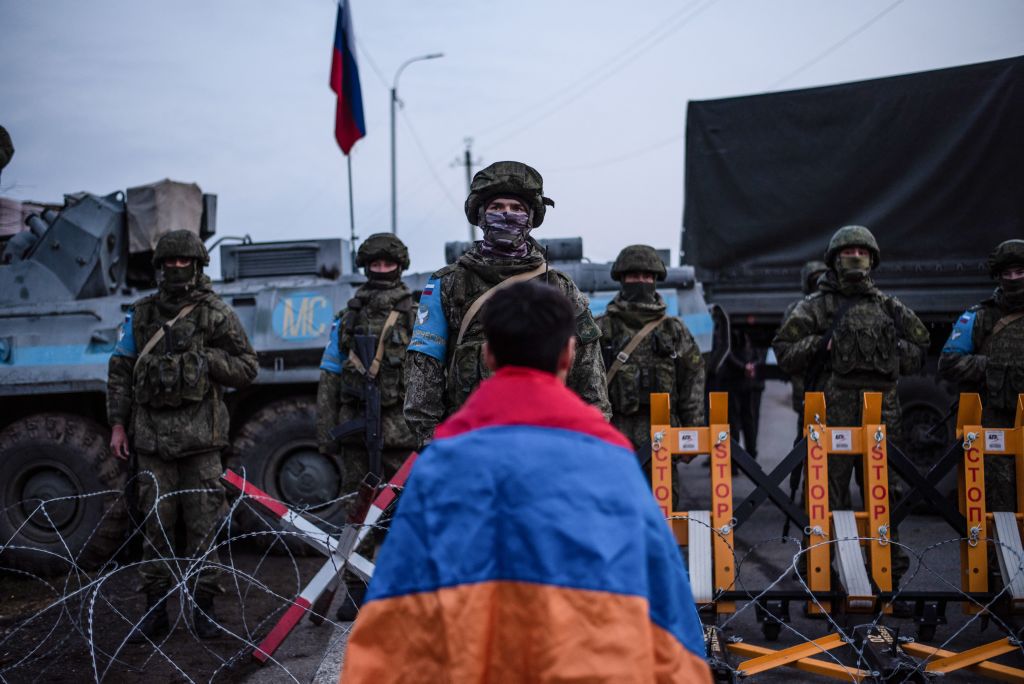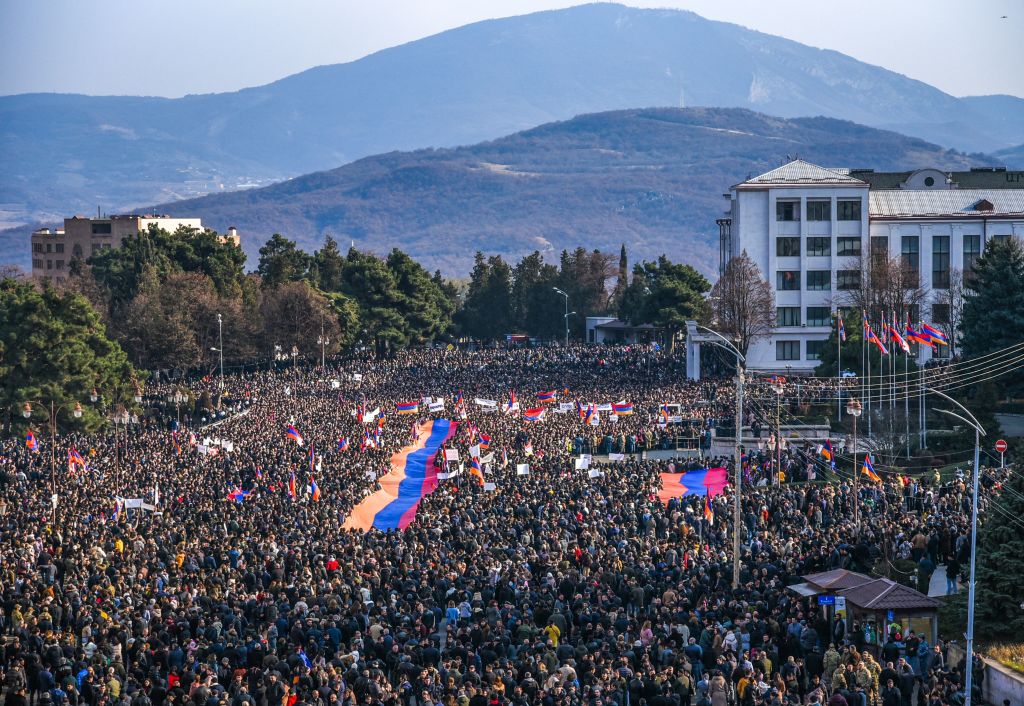
Mariam Abrahamyan is a hard woman to get in touch with. She appears on the screen for just a few moments before the picture freezes and she drops off the video call. “Sorry,” she says after phoning back a minute later, “our power went out again and the internet went down.”
For more than a month now, the 30-year-old Armenian mother of three has been cut off from the rest of the world by a near-total blockade on the only road in or out of Nagorno-Karabakh—a disputed territory nestled between Armenia and Azerbaijan—that she and her family call home. Regular supplies of food and medicine have been stopped by Azerbaijan, and locals say supermarket shelves are empty and pharmacies are running out of essential prescriptions, while officials warn a famine could now be on the cards.
“We didn’t think it would last this long,” Abrahamyan says. “But what’s really frightening is not knowing when it will end. We made the decision to stay here, and I dread the day one of my children might turn around and ask why we chose to live in a place like this.”
Nagorno-Karabakh has already seen two wars within Abrahamyan’s lifetime. In the 1990s, as the Soviet Union unraveled, erstwhile members Armenia and Azerbaijan fought a series of fierce battles over the mountainous region, with hundreds of thousands of ethnic Azeris displaced from the region, and thousands killed on both sides. Nagorno-Karabakh is located inside Azerbaijan’s internationally-recognized borders, but locked behind a line of landmines and defensive positions, and for three decades it was accessible only from Armenia. Governed as the unrecognized Republic of Artsakh, its officials point to two referendums held in 1991 and 2006 as proof that those living there have chosen independence.
But in 2020, Azerbaijani troops launched an offensive to retake Nagorno-Karabakh, conquering swathes of territory and leaving Karabakh Armenians in control of just their de facto capital, Stepanakert, and the surrounding area. Only a Moscow-brokered ceasefire ended the war, putting the sole highway linking Nagorno-Karabakh to Armenia—known as the Lachin Corridor—under the control of a 1,500-strong Russian peacekeeping contingent, with Azerbaijani troops stationed behind the wire fence on both sides of the road.
Read More: Inside Azerbaijan’s Grand Plan To Make the Disputed City of Shusha a Cultural Capital
Yet with Russia bogged down in Ukraine, there are fears the battle-scarred Nagorno-Karabakh could see conflict once again as Moscow fails to step in.
Road to nowhere
On the morning of Dec. 12, a group of self-described Azerbaijani eco-protesters pushed past the Russian peacekeepers and set up camp on the Lachin Corridor, stopping traffic. They allege Karabakh-Armenians have been using the road to export illegally-mined gold at the expense of the environment, while importing landmines and other military hardware as the Russians watch on. Now, officials say the Russian peacekeeping convoys and a smattering of Red Cross relief vehicles are the only ones that are able to pass—nowhere near enough to replace the 400 tons of goods that used to arrive daily from Armenia.
More from TIME
“We don’t see much of the Russians,” Adnan Huseyn, one of the Azerbaijani organizers of the sit-in says. “During the first few days, we had eye-to-eye contact with the peacekeepers, but there were no problems. We watched the World Cup together, which was actually nice. Most of the time they kept quiet.”
While Huseyn’s group insists it is moving aside for humanitarian convoys and denies it is staging a blockade, Armenia alleges they were sent by Azerbaijan in order to spark a crisis and lay the ground for “ethnic cleansing” of the region. Azerbaijani President Ilham Aliyev, whose government has repeatedly cracked down on political protests at home, has described the demonstrators as the pride of the nation, while observers have been quick to point out few have any prior record of environmental activism.
Tom de Waal, a senior fellow at Carnegie Europe and author of several books on the conflict, has argued that the protesters had “evidently been sent there by the government in Baku,” and Western nations including the U.S. have called on Azerbaijan to unblock the road.
Now, anger is building as the humanitarian situation grows dire and Russia appears reluctant to force a reopening of the road. “Armenia is a firm supporter of the Russian peacekeepers,” the country’s Prime Minister Nikol Pashinyan said in December, as it became clear the protesters were there to stay. “But it is unacceptable for us that they are becoming a silent witness to the depopulation of Nagorno-Karabakh.”
Broken promises
In Stepanakert, propaganda posters of the Russian peacekeepers hang in shop windows, looking out over the rows of empty shelves. “Karabakh, live in peace,” one reads. For many ethnic Armenians in the breakaway region, Russian is a native language on par with Armenian, and Moscow has long been seen as a close ally. But since the 2020 war, many locals say their existence feels more precarious than ever and that Azerbaijan is intent on asserting control over their unrecognized state.
In a poll published by the Caucasus Research Resource Center in January, fewer than half of 400 Karabakh-Armenian respondents said independence would help settle the conflict in the disputed territory. Almost one in four said they would prefer to be annexed by Moscow and given special status as part of the Russian Federation—slightly more than the number that back unification with Armenia.
“I’m not political,” says Abrahamyan. “I only know that the Russians have a duty to protect us, and they’re not doing that.”
On Dec. 24, a delegation of Karabakh-Armenians marched to the peacekeepers’ checkpoint on the Lachin Corridor, where the Azerbaijanis have been staging their sit-in, to demand the road be reopened. “The Russian officer there told us to go home and not to worry,” says Marut Vanyan, a 39-year-old blogger from Stepanakert who joined the group. “He told us the road would be reopened within two days, like it was before. That never happened.”
According to Vanyan, one of the protest organizers told the peacekeepers that locals were losing trust in them and, if the worst comes to the worst, they would take their families and leave—with Moscow losing its foothold in the region.
Three days later, dozens of men, women, and children walked to the gates of the peacekeeping headquarters to demand answers. “Putin, keep your word,” read one sign carried by a young boy. Guards told the crowd that they were unable to get hold of their commander, Major General Andrey Volkov, and he was the only one who could answer their questions. Many Karabakh-Armenians now fear a protracted blockade or another Azerbaijani military offensive could see them forced to flee their homes for good.

Man from Moscow?
Azerbaijan has long accused Armenia of being a Russian puppet state, pointing to Yerevan’s membership of the Moscow-led Collective Security Treaty Organization and the close economic ties between the two countries. At the same time, just two days before Moscow’s Feb. 24 invasion of Ukraine, Aliyev himself traveled to meet with President Vladimir Putin and sign a deal upgrading their relations to alliance level.
But the standoff between the two sides has only worsened in recent weeks after an enigmatic Russian-Armenian oligarch, Ruben Vardanyan, announced he was moving to Nagorno-Karabakh in September. The Yerevan-born billionaire was initially coy about seeking political office but, two months later, was suddenly appointed State Minister of the unrecognized Republic of Artsakh, making him effectively the most powerful man in Stepanakert overnight.
Since then, talks with Azerbaijan have broken down, with Aliyev accusing Vardanyan of having been “sent from Moscow with a very clear agenda.” Officials in Baku point to the fact that he has been sanctioned by Ukraine as proof of his close ties to the Russian state. Kyiv says his business interests “undermine or threaten the territorial integrity, sovereignty, and independence of Ukraine.”
Speaking via video link from his office in the blockaded region, Vardanyan rejects those charges. “People don’t understand when someone like me decides to give up his family and his lifestyle,” he says with a half-smile. “I decided it is the right time to be with my people and [the Armenian] nation.”
The 54-year-old banking magnate is careful to avoid directly criticizing the role of Russian peacekeepers in Nagorno-Karabakh, but firmly denies Moscow has any undue influence over the region. “I can’t just pick up the phone and call Vladimir Putin,” he laughs, “the peacekeepers are only 2,000 people standing between the Armenian population and the sizable Azerbaijani army. It’s tough, and it’s clear Russia’s attention isn’t here—it’s in the West, given Ukraine.”
Crisis in the Kremlin
“For Putin, conquering Ukraine has become an all-encompassing issue and there’s little interest at the top for anything else,” says Jade McGlynn, a researcher at the Department of War Studies at King’s College London. “Moscow’s quest to increase its influence has left it a diminished and less formidable power in the South Caucasus. Putin may not see that, but the Foreign Ministry does—it’s just being sidelined. Junior diplomats are in despair.”
While Karabakh-Armenians fear their calls for help are falling on deaf ears, others are questioning whether Moscow was ever a reliable security guarantor in the first place. “Russia is exploiting the conflict to further its own interests. Ultimately, its strategy is about maintaining an imperial grip on the region,” says Michael Cecire, a senior policy advisor at the Commission on Security and Cooperation in Europe, a U.S. government agency.
From Yerevan, Pashinyan is now calling on the international community as a whole to step up and put an end to the humanitarian crisis in Nagorno-Karabakh, arguing a U.N. peacekeeping mission should take over if the Russians cannot fulfill their commitments. The U.S., along with the U.K. and a number of European nations, have expressed concern over the situation, while France has emerged as a leading ally for Armenia, tabling an unsuccessful motion condemning Baku at the U.N. Security Council.
Read More: Column: The Humanitarian Crisis in Nagorno-Karabakh Is a Textbook Example of Ethnic Cleansing
On Tuesday, RFERL reported that the E.U. has now agreed to send a monitoring mission to Armenia for as long as two years, in a sign that Brussels is concerned about the prospect of new clashes along the internationally-recognized border between Armenia and Azerbaijan. While the civilian team will not enter Nagorno-Karabakh, the move has been interpreted as a sign that the West is stepping up to fill the power vacuum left by Russia.
But Elin Suleymanov, Azerbaijan’s ambassador to Britain, says that no outside power will be able to impose a solution to the standoff over the region. “Armenia’s problem is structural dependency—and now they’re looking to the West and hoping France will be their big daddy.”
For Vardanyan, confined to the blockaded region he moved to just months ago, the outside world feels a very long way away, and he warns the Karabakh-Armenians can’t expect to depend on anyone but themselves.
“It’s like a Russian fairytale—there’s a hero standing in front of a crossroads,” he says. “One way, you lose your independence, another, you lose your home. The third way is to fight. We don’t want war, but of these three options we have to make a choice, even if it is dangerous and you can lose your life. We need to be ready for this.”
More Must-Reads from TIME
- Cybersecurity Experts Are Sounding the Alarm on DOGE
- Meet the 2025 Women of the Year
- The Harsh Truth About Disability Inclusion
- Why Do More Young Adults Have Cancer?
- Colman Domingo Leads With Radical Love
- How to Get Better at Doing Things Alone
- Michelle Zauner Stares Down the Darkness
Contact us at letters@time.com